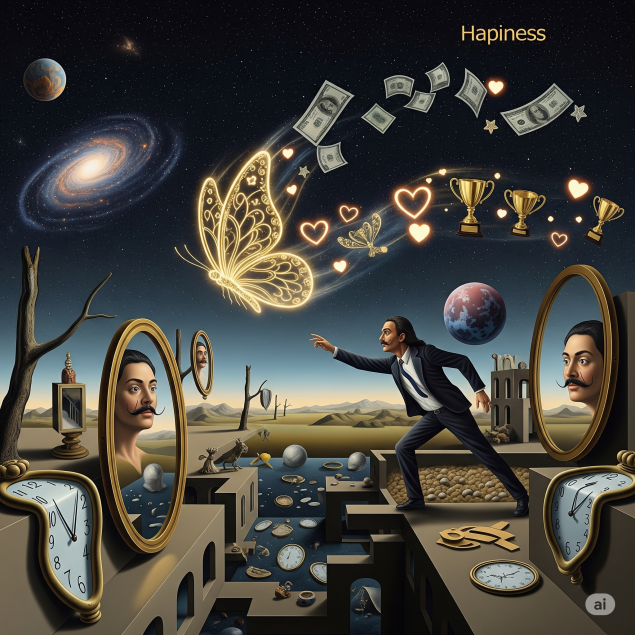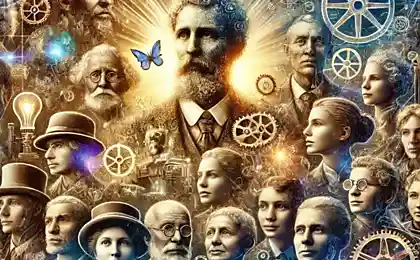225
The Big Problem: Why Happiness Cannot Be Achieved

Imagine that you have achieved everything you dreamed of. The bank account is full, the career is at its peak, the relationship is perfect. And all of a sudden, emptiness. Familiar? Welcome to the greatest paradox of human existence. We spend our lives chasing happiness like a cat after its tail, and the result is the same.
Why is this happening? Maybe the problem is not that we do something wrong, but the very nature of happiness. The great German philosopher Immanuel Kant thought so. And its findings can dramatically change your view of life.

The trap of the infinite "more"
For everyone, happiness is something special: wealth, beauty, power, crowds of fans or a loving family. But there’s one thing all these pursuits have in common: they never end. A person can become even richer, even more popular, even more influential. When asked, “Who’s the sweetest person in the world?” a magic mirror will always point to someone else.
Perfection knows no bounds, but that’s what we focus on. No one wants second place or average income. I always want more. So happiness slips out of our hands like water through our fingers.
This is not a philosophical abstraction, but a cruel reality. Look at the stars of show business, billionaires, politicians – many of them suffer from depression, addiction, loneliness. Paradox? No, the pattern.
Why our brains are working against us
Evolutionarily, we are programmed to constantly strive for improvement. Our ancestors, who were content with little, did not survive. The survivors were those who always wanted more food, better shelter, stronger offspring. This mechanism has survived, but in the modern world it works against us.

Kant and Mathematics of the Impossible
Immanuel Kant, studying the nature of happiness, came to a revolutionary conclusion: the very concept of happiness is uncertain. We all want to do it, but we don’t even know how to do it theoretically. Why?
Give a man everything he wants, and at the same moment he will feel that it is not everything.
All the elements of conventional happiness—money, health, relationships, success—are empirical, that is, measurable. And they can always be better. Kant concludes that a person cannot achieve a final result because the process is endless.
Side effects of the pursuit of happiness
Moreover, the pursuit of certain elements of happiness often leads to the opposite result:
Health: Excessive fixation on health leads to anxiety. Attention is focused on the smallest signals of the body, problems are invented out of thin air. The result is constant stress, endless trips to the doctors, financial expenses.
Money: The accumulation of capital makes it necessary to give up many joys. When there is money, there is a new problem – not to lose it. I always think about the need to move on, because competitors do not sleep.
Behind each conquered peak there is another, even steeper and more dangerous. It’s like a game where the rules change after each level and the final boss is an illusion.
The concept of absolute well-being
Happiness, by definition, cannot be partial. It represents absolute well-being in the present and future. To be happy means never to feel dissatisfaction, never to feel the taste of suffering. But such a scenario is unrealistic.
Stop thinking of happiness as a permanent state. Think of it as a series of things you can see and appreciate. Happiness is not a destination, but a way of traveling.
In the life of any person – the richest, most popular, smartest, most beautiful – there are bad days full of grief, loss and pain. It's not a bug, it's a feature of human existence.

The Alternative Path: From Results to Process
Kant suggested taking things that supposedly bring happiness closer as advice rather than mandatory instructions. Every step in this direction can bring joy, but important decisions need to be made based on logic and a long-term perspective.
Impulsivity or emotional pursuit of happiness often spoils life and puts an end to the biggest dreams. The paradox is that the less we chase happiness, the more often it appears.
Practical recommendations
Instead of endless pursuit of an unattainable ideal, try the following approaches:
1. Kant saw the way to true satisfaction through moral actions. In this area, the ideal is attainable and the path is clear. You always know when you did right or wrong.
2. Happiness often appears as an inconspicuous part of the overall scenery of life when not looked at. Learn to notice the good moments in real time, not just in hindsight.
3. Decide for yourself how much money, recognition, success you really need for a comfortable life. Anything beyond that is a bonus, not a necessity.
4. Research shows that relationship quality is the only factor that consistently correlates with subjective well-being. What matters is not the number of friends, but the depth of the connection.
Metaphysical happiness
Kant did not deny the possibility of happiness entirely. He suggested thinking about metaphysical happiness—the belief that well-being is proportional to the number of things you do right. This is not necessarily a religious belief, but a hope for the justice of the universe.
Man needs a moral compass, a hope for a future where good is rewarded. Otherwise, the question arises: why do we need morality, social norms, ethical principles?
This is not naive optimism, but practical wisdom. People who live by their principles experience less internal conflict and more satisfaction in life.
Where to find happiness
The paradoxical answer is: every day. But not in the sense of “rejoice in the little things”, but in the sense of “stop putting off life for later”. Happiness is hidden from a determined hunter, but it often happens by accident when we are busy doing something important.
In some incomprehensible way, happiness hides from the determined hunter, but often appears as an inconspicuous part of the general scenery of life when not looked at.
How many times have you realized that you were happy, but in hindsight? It's not a coincidence, it's a pattern. Happiness is a side effect of a meaningful life, not its goal.
Conclusion: Accepting the Paradox
Perhaps it is that happiness is unattainable, and its main value lies. If we could achieve absolute happiness and stop there, life would be meaningless. Striving for the best is what makes us human.
Kant was right: happiness as the ultimate goal is an illusion. But that is no cause for despair. It is a release from impossible obligations to oneself and an invitation to a more meaningful life.
Stop chasing happiness. Live in such a way that it finds you. Do the right things, take care of loved ones, develop, create something of value. Happiness will come as a natural consequence, not as a reward for effort.
Glossary
Empirical - based on experience, measurable, observable and quantifiable.
Metaphysical happiness is Kant’s concept of happiness based on faith in the justice of the universe and the proportionality of good deeds and well-being.
The utilitarian value system is a philosophical concept according to which the correctness of actions is determined by their usefulness and effectiveness.
The categorical imperative is the central concept of Kant’s ethics, the principle that one should act only according to a maxim that can become a universal law.
Subjective well-being is an individual assessment of the quality of one’s own life, including emotional and cognitive components.
10 ways to avoid empty conversations and start having deep conversations
9 Things Not to Do When It’s Too Hot Outside























